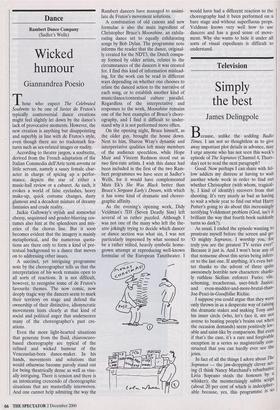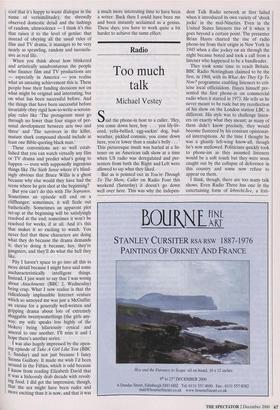Television
Simply the best
James Delingpole
Because, unlike the sodding Radio Times, I am not so thoughtless as to give away important plot details in advance, may I urge anyone who has not seen this week's episode of The Sopranos (Channel 4, Thurs- day) not to read the next paragraph?
Good. Now perhaps I can share with fel- low addicts my distress at having to wait another whole week in order to find out whether Christopher (with whom, tragical- ly, I kind of identify) recovers from that shooting. It's very nearly as bad as having to wait a whole year to find out what Harry Potter's going to do about this increasingly terrifying Voldemort problem (God, isn't it brilliant the way that fourth book suddenly turns so dark?).
As usual, I ended the episode wanting to prostrate myself before the screen and go: '0 mighty Sopranos, I worship you, for truly you are the greatest TV series ever!' Because it just is. And I won't hear any of that nonsense about this series being inferi- or to the last one. If anything, it's even bet- ter thanks to the advent of three quite awesomely horrible new characters: sharki- ly ruthless Sicilian enforcer Furio; vile, scheming, treacherous, user-bitch Janice; and even-madder-and-more-brutal-than- Joe-Pesci-in-Goodfeilas Richie.
I suppose you could argue that they were only thrown in as a desperate way of raising the dramatic stakes and making Tony and his inner circle (who, let's face it, are not averse to beating people's brains out when the occasion demands) seem positively lov- able and saint-like by comparison. But even if that's the case, it's a rare and forgivable exception in a series so magisterially con- structed that you can hardly ever see the joins. In fact of all the things I adore about The Sopranos — the jaw-droppingly clever act- ing (I think Nancy Marchand's rebarbative Livia Soprano steals the honours by a whisker); the mesmerisingly subtle script (about 20 per cent of which is indecipher- able because, yes, this programme is so cool that it's happy to Waste dialogue in the name of verisimilitude); the shrewdly observed domestic detail and the lashings of random, ultraviolence — I think it's this that raises it to the level of genius: that instead of obeying all the usual rules of film and TV drama, it manages to be very nearly as sprawling, random and inconclu- sive as real life.
When you think about how blinkered and artistically unadventurous the people who finance film and TV productions are — especially in America — you realise what an amazing achievement this is. These people base their funding decisions not on what might be original and interesting, but on what has been successful before. And the things that have been successful before invariably obey rigid how-to-write-a-screen- play rules like 'The protagonist must go through no fewer than four stages of per- sonal development between acts two and three' and 'The survivors in the killer, mutant shark compound should include at least one Bible-quoting black man.'
These conventions are so well estab- lished that you can watch virtually any film or TV drama and predict what's going to happen — even with supposedly ingenious things like The Sixth Sense where it's blind- ingly obvious that Bruce Willis is a ghost because why else would they have had the scene where he gets shot at the beginning?
But you can't do this with The Sopranos. Sometimes an episode will end on a cliffhanger; sometimes, it will fizzle out bathetically. Sometimes an apparent plot set-up at the beginning will be satisfyingly resolved at the end; sometimes it won't be resolved for weeks, if at all. And it's this that makes it so exciting to watch. You never feel that these characters are doing what they do because the drama demands it; they're doing it because, hey, they're gangsters, and they'll do what the hell they like.
Pity I haven't space to go into all this in more detail because I might have said some uncharacteristically intelligent things. Instead, I just want to say that I was wrong about Attachments (BBC 2, Wednesday) being crap. What I now realise is that the ridiculously implausible Internet venture Which so annoyed me was just a McGuffin: an excuse for a generally well-written and gripping drama about lots of extremely shaggable twentysomethings (the girls any- way; my wife speaks less highly of the blokes) being hilariously cynical and amoral to one another. I'll miss it and I hope there's another series.
I was also hugely impressed by the open- ing episode of Take A Girl Like You (BBC 1, Sunday) and not just because I fancy Sienna Guillory. It made me wish I'd been around in the Fifties, which is odd because know from reading Elizabeth David that it was a hideously drab decade with revolt- ing food. I did get the impression, though, that the sex might have been ruder and more exciting than it is now, and that it was a much more interesting time to have been a writer. Back then I could have been me and been instantly acclaimed as a genius. These days, you have to work quite a bit harder to achieve the same effect.



















































































 Previous page
Previous page